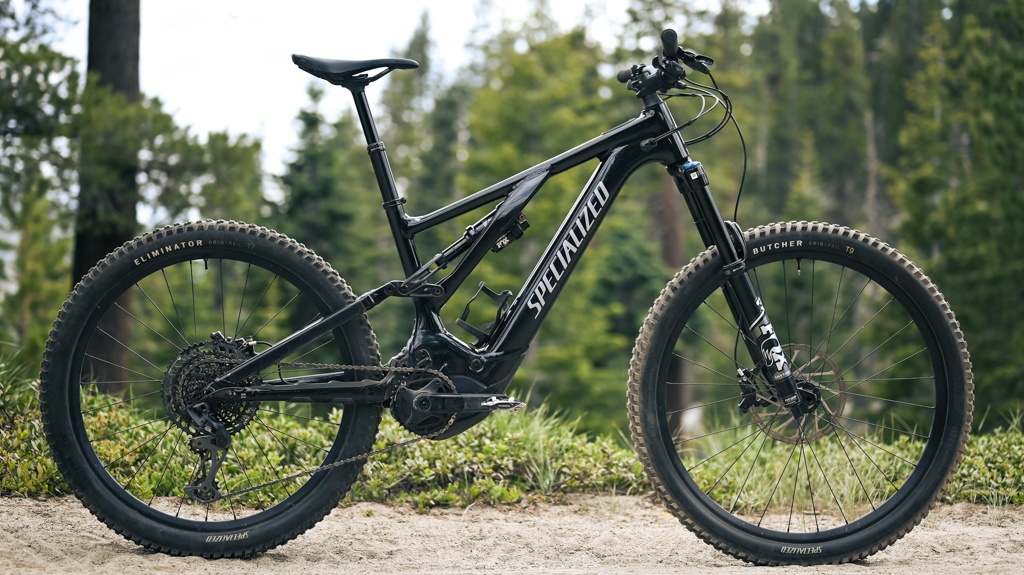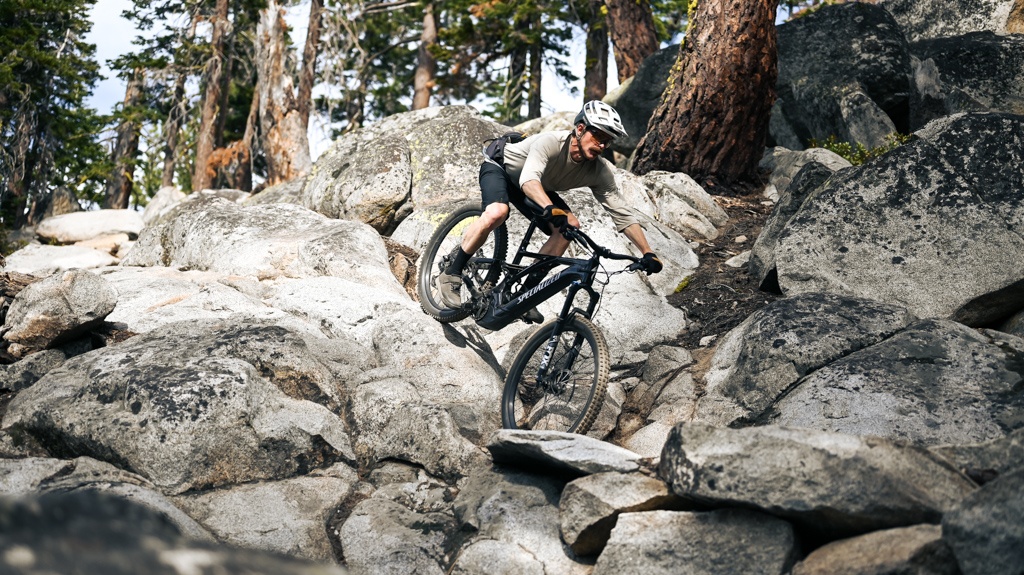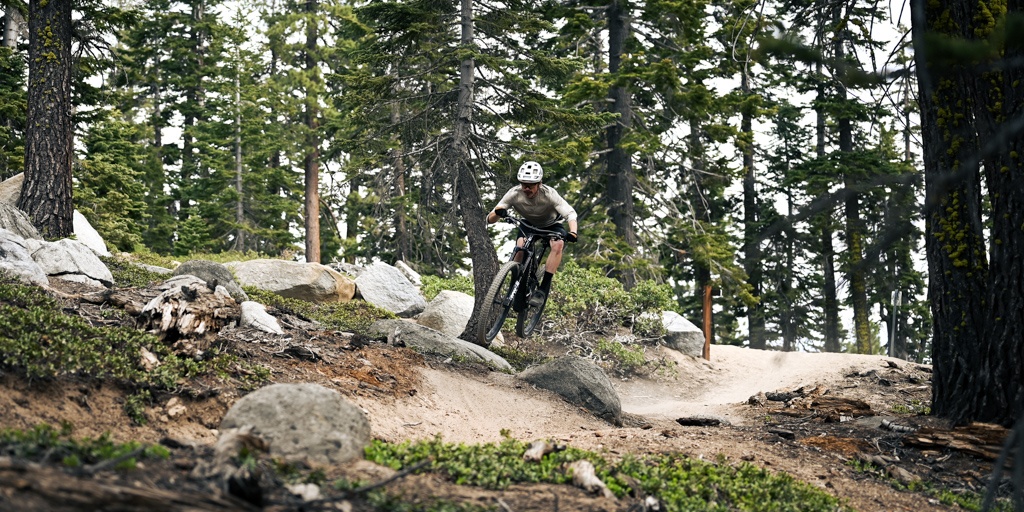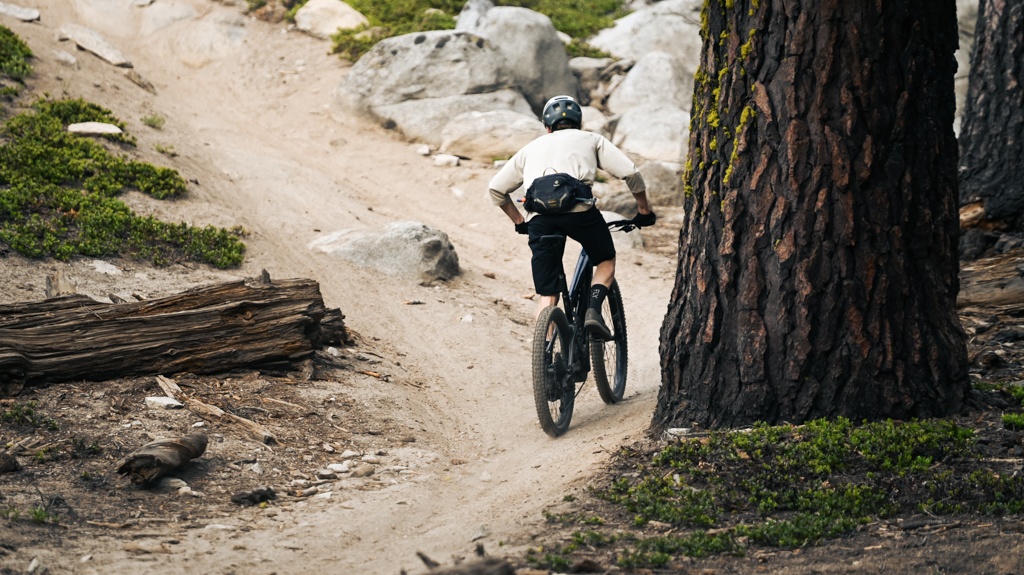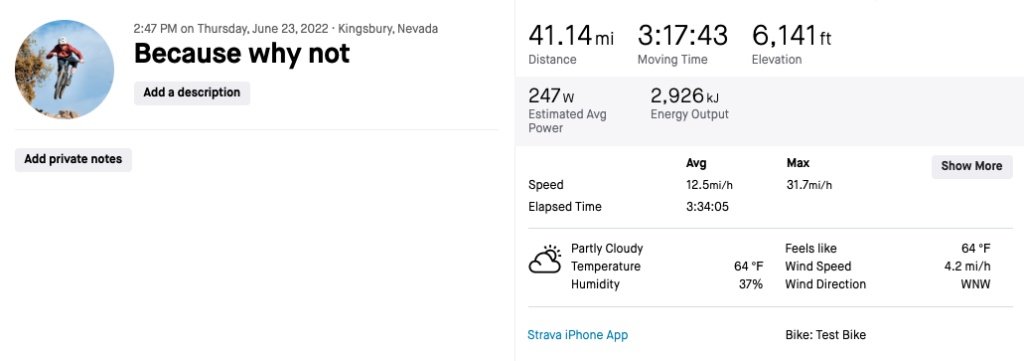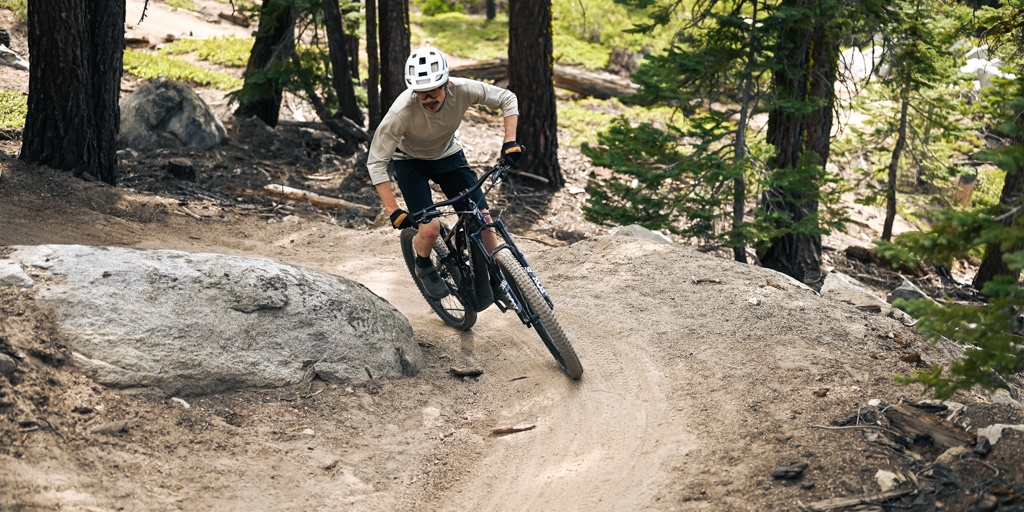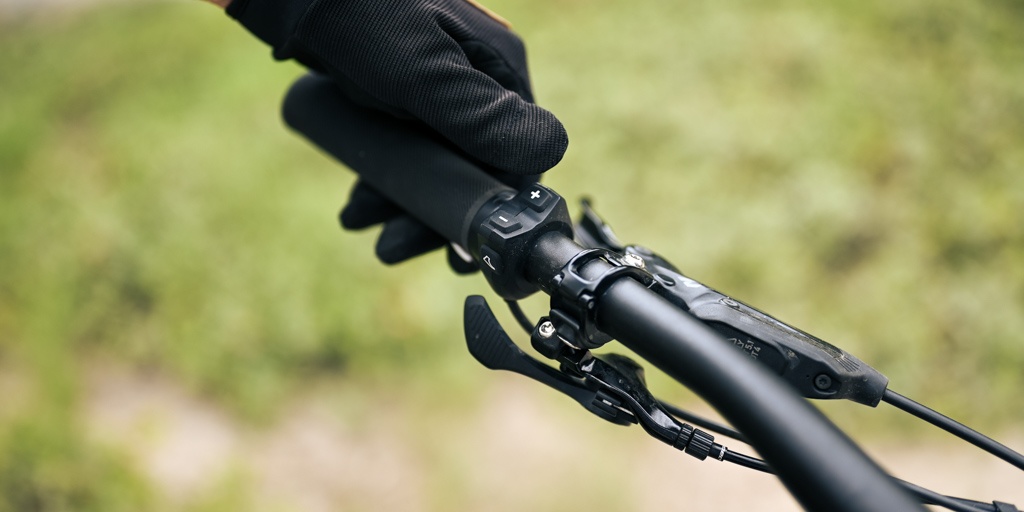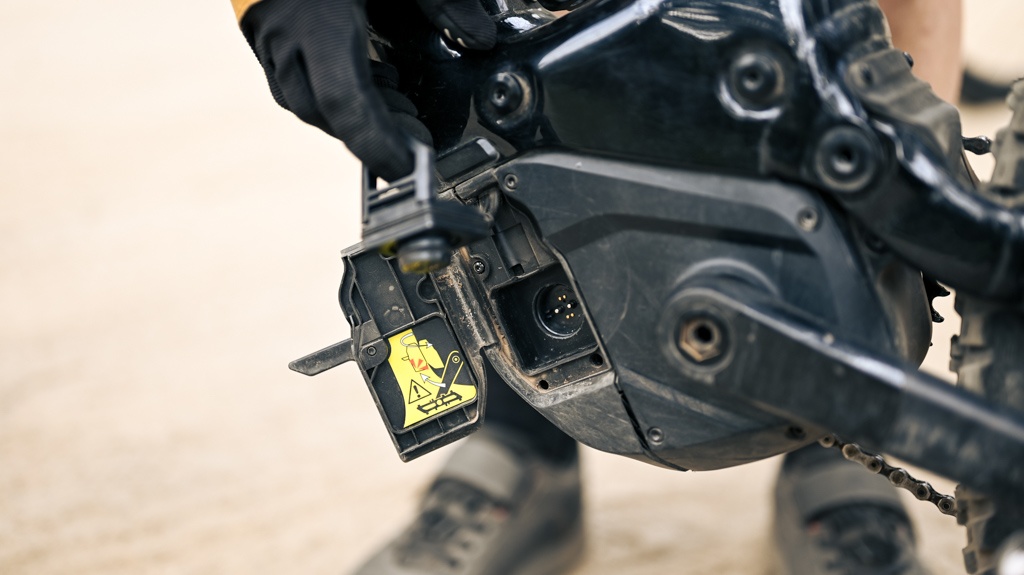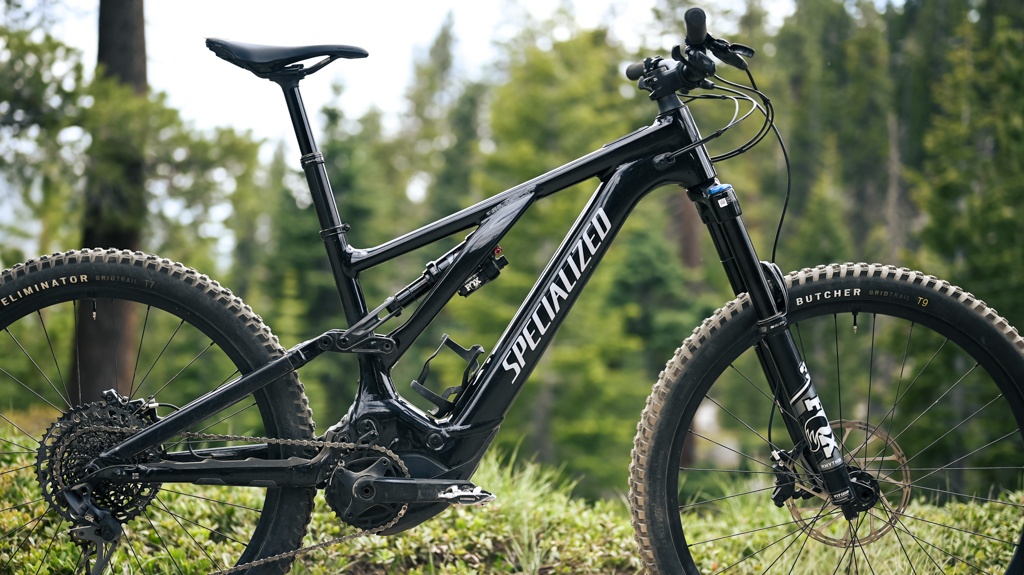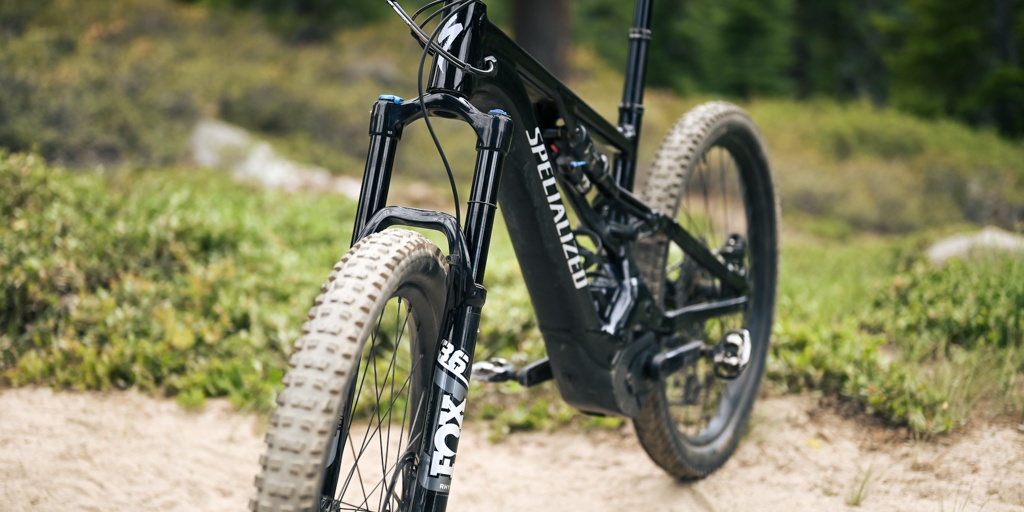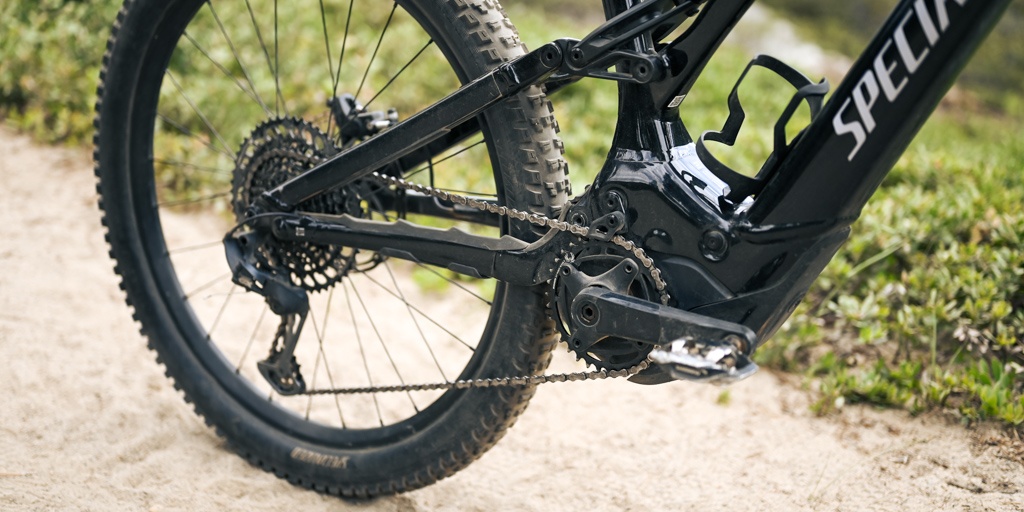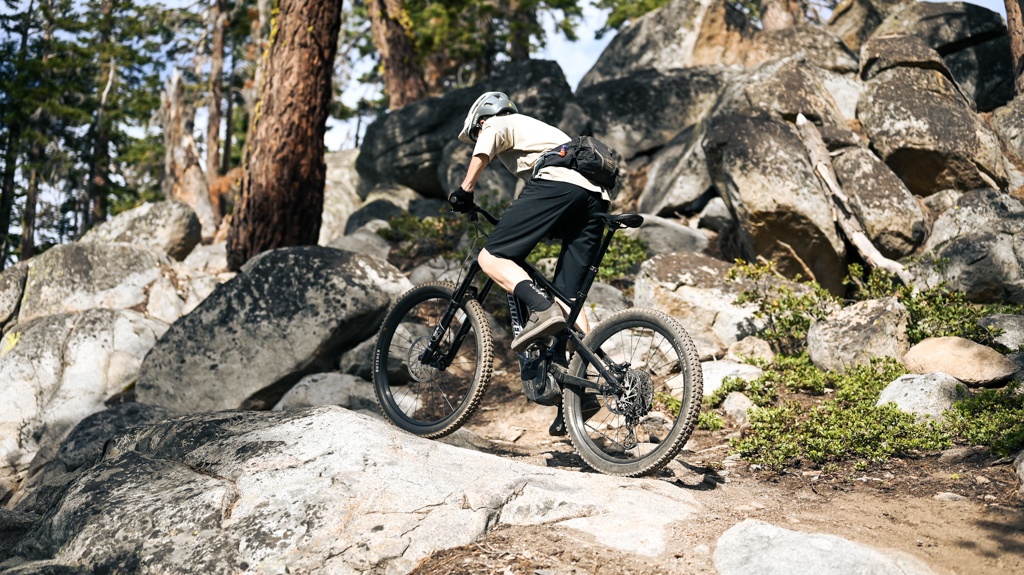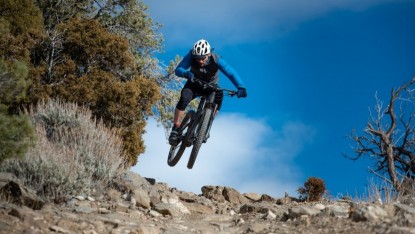Our Verdict
Compare to Similar Products
 This Product
Specialized Turbo Levo Comp Alloy | |||||
|---|---|---|---|---|---|
| Awards | Best Overall E-MTB | Best for Range | Best Bang for the Buck | ||
| Price | $7,000 List | $6,999 List | $2,899 List $2,599 at Aventon Bikes | $5,800 List | $3,899 List |
Overall Score  |
|||||
| Star Rating | |||||
| Bottom Line | Continued refinement keeps this well-rounded model at the top, and the highly adjustable geometry makes it more versatile than ever | A well-rounded trail riding e-MTB with a huge battery, nice build, and reasonable price | Any assessment of this bike has to follow the price tag; many people don't need or want a 5-figure e-bike, and Aventon delivers a banger | A versatile but hard-charging electric mountain bike for the budget-conscious rider | A solid value with just a few compromises: an excellent first e-bike for the trail rider |
| Rating Categories | Specialized Turbo L... | Canyon Spectral:ON... | Aventon Ramblas | Commencal Meta Powe... | Ari Wire Peak 2.0 Comp |
| Downhill Performance (30%) | |||||
| Climbing Performance (25%) | |||||
| Measured Effective Range (25%) | |||||
| Power Output (15%) | |||||
| E-Bike Controls (5%) | |||||
| Specs | Specialized Turbo L... | Canyon Spectral:ON... | Aventon Ramblas | Commencal Meta Powe... | Ari Wire Peak 2.0 Comp |
| Battery Size (Wh) | 700Wh | 900Wh | 708Wh | 630Wh | 635Wh |
| Wheel size (inches) | MX (29" front, 27.5" rear) | MX (29" front, 27.5" rear) | 29 | 29 | 29 |
| Motor System | Specialized Turbo Full Power 2.2 | Shimano EP8 | Aventon A100 | Shimano EP8 | Shimano E7000 |
| Motor Power (torque) | 90Nm | 85Nm | 100Nm | 85Nm | 60Nm |
| Measured Weight (w/o pedals) | 51 lbs 3 oz (S4) | 51 lbs 15 oz (Large) | 54 lbs (Large) | 53 lbs 8 oz (Large) | 55 lbs (Large) |
| Measured Effective Range | 33.1 miles | 38.5 miles | 30.1 miles | 26.1 miles | 20.5 miles |
| Fork | Fox Rhythm 36, 160mm | Fox 36 Rhythm Grip, 150mm | Rock Shox 35 | RockShox 35 Gold RL, 150mm | RockShox Recon SIlver RL 150mm |
| Suspension & Travel | Future Shock Rear (FSR) - 150mm | Triple Phase155mm | N/A | Contact System 4-bar, 140mm | 4- bar Linkage |
| Shock | Fox Float X Performance | Fox DPS Performance EVOL | N/A | RockShox Deluxe Select+ | X-Fusion 02 Pro RL |
| Frame Material | M5 Premium Aluminum | Carbon Fiber | Aluminum | Alloy 6066 | Aluminum |
| Frame Size Tested | S4 | Large | Large | Large | Large |
| Available Sizes | S1-S6 | S-XL | S-XL | M-XL | S-XL |
| Wheelset | Specialized 29 Alloy | SunRingle Duroc SD37 Comp | Double Wall Ally rims, 13g spokes, 110/148 hubs | Spank Spike Race 33 rims with Formula hubs | WTB ST i30 TCS |
| Front Tire | Specialized Butcher GRID TRAIL GRIPTON T9 29" x 2.6" | Maxxis Assegai EXO 29 x 2.5 | Maxxis Rekon 29x2.4" | Maxxis Minion DHR II EXO+ 2.4" | Maxxis Minion DHF EXO 29 x 2.5" WT |
| Rear Tire | Specialized Eliminator GRID TRAIL GRIPTON T7 27.5" x 2.6" | Maxxis Minion DHR II EXO+ 27.5 x 2.6 | Maxxis Rekon 29x2.4" | Maxxis Minion DHR II EXO+ 2.4" | Maxxis Dissector EXO 29x2.4" |
| Shifters | SRAM GX Eagle 12-speed | Shimano SLX 12-speed | SRAM NX Eagle | SRAM SX Eagle | SRAM SX Eagle |
| Rear Derailleur | SRAM GX Eagle | Shimano XT | SRAM NX Eagle | SRAM SX Eagle | SRAM SX Eagle |
| Crankset | Praxis M30 | Shimano STEPS | Aventon | E13 E*Spec EP8 | Shimano FC-E8000 |
| Crankarm length | 160mm | 165mm | 165 | 165mm | 160mm |
| Cassette | SRAM XG1275, Eagle 10-52T | Shimano Deore M6100 10-51T | SRAM PG-1210 10-50t | SRAM SX 10-50T | SRAM PG-1210 11-50t |
| Chain | SRAM NX Eagle | Shimano CN-M6100 | SRAM NX Eagle | SRAM NX Eagle | SRAM SX Eagle |
| Saddle | Specialized Bridge Comp | Fizik Terra Aidon X5 | Aventon Padded | Fabric Scoop Flat Sport V2 | Selle Italia X3 boost 148mm |
| Seatpost | X-Fusion Manic 175mm (S4/S5) | Iridium, 175mm (size Large) | 31.6, 150mm droppers (125mm on S) | KS Rage-I | X-Fusion Manic 175mm (Size Large) |
| Handlebar | Specialized Alloy 780mm | Canyon:ON HB0057 Riser | Alloy 760mm, 35mm, 9 deg rise | Ride Alpha R20 E-Bike, 780mm | Ari Team 35 800mm 25mm rise |
| Stem | Specialized Alloy Trail | Canyon:ON ST0031 | 35mm Ø, 40mm length | Ride Alpha Freeride 50mm | Ari 35 |
| Brakes | SRAM Code R 4-piston 220mm front and 200mm rear rotor | Shimano SLX M7120 4-piston | SRAM DB8 200mm / 180mm | SRAM Guide RE 4 piston 200mm rotors | TRP Slate EVO 200mm rotors |
| Grips | Specialized Trail Grips | Canyon Lock-On | Lock-On | Ride Alpha DH | Lock-On |
| Measured Effective Top Tube (mm) | 630 | 637 | 642 | 626 | 613 |
| Measured Reach (mm) | 477 | 485 | 455 | 485 | 480 |
| Measured Head Tube Angle | Adjustable between 63.5 and 65.5-degrees in 1-degree increments | 65.5 | 66.5 | 64.5 | 64.5 High / 64 Low |
| Measured Seat Tube Angle (effective) | 76.2-degrees | 76.5 | 74.5 | 77.5 | 79 High/ 78.5 Short |
| Measured Bottom Bracket Height (mm) | 350mm | 36-drop | 324mm | 345mm | |
| Measured Wheelbase (mm) | 1255 | 1252 | 1230 | 1279 | 1244 |
| Measured Chain Stay Length (mm) | 442 | 440 | 465 | 453 | 434 |
Our Analysis and Test Results
Few brands update their products as frequently as Specialized, but to stay at the forefront of innovation, design, and performance, nearly every model in their lineup sees some level of redesign every couple of years. For the 2022 model year, Specialized continues to improve upon the award-winning Turbo Levo Comp with the primary changes being the new Turbo Full Power 2.2 motor, a move to mixed wheel sizes (aka MX or mullet), and the highly adjustable geometry found on the new Stumpjumper EVO models. The result is an extremely refined and well-integrated electric mountain bike package with enhanced versatility through quick and easy geometry adjustments. While the previous version slotted squarely in the trail riding category, the new Turbo Levo Comp Alloy has you covered for a much broader range of riding styles and scenarios while still pumping out all the power, range, and smiles we've come to expect from one of the top electric mountain bikes on the market.
Performance Comparison
Downhill Performance
We loved the previous version of the Levo Comp Alloy because it handled the most like a “regular trail bike” of all the full-power, heavyweight models we've tested. Well, despite the move to mixed wheel sizes and the highly adjustable geometry of the new version, Specialized has managed to maintain that level of agility while also giving the rider the option to set the bike up for a much wider range of terrain or to match their riding style and preferences. This unprecedented level of adjustability is truly unique, making the Levo a snappy trail bike, a steeps slayer, and everything in between, with enough travel to handle just about anything.
One of the biggest changes to the design of the '22 Turbo Levo Comp Alloy is the geometry adjustments. While not identical, it is essentially an electric version of the Stumpjumper EVO, that allows you to choose between 6 distinctly different geometry settings by using swappable head cups and flip chips on the chainstays. Unlike other bikes that have flip chips that make small changes to geometry, the Levo's system makes very substantial changes to significantly alter the bike's character. By rotating or swapping the upper headset cup, you can adjust the head angle into three positions with a full degree of change in each. Our test bike arrived in the neutral setting at 64.5 degrees, and it can be adjusted to 65.5 degrees in steep or 63.5 degrees in slack. At the rear of the bike, the flip-chips on the chainstays change the bottom bracket height by 7mm between the high and low settings. So, if you're going for a pedal-heavy trail ride or you prefer quicker handling, set it up steep and high. Likewise, if you're going to ride steeps all day, set it slack and low. Swapping the head cups and flipping the chips is fairly straightforward and only takes a few minutes, and it really allows you to choose the setup that best matches your style, preferences, or terrain of the day.
The other big change is the move to mixed wheel sizes. Mixed, MX, or “mullet” wheels refer to having a larger 29-inch front wheel and a smaller 27.5-inch rear wheel. This setup is becoming increasingly common, especially on electric mountain bikes, because it provides the best of both worlds. The larger front wheel rolls over obstacles more easily and provides front-end stability, while the smaller rear wheel keeps the back end of the bike more maneuverable and provides better clearance in steep terrain. With weights in the 50-pound range, full-power e-MTBs can be a bit of a handful to maneuver in tight spots, and the smaller rear wheel definitely helps to keep the rear end feeling sporty and quick. Good weight distribution also helps, and Levo's low center of gravity is beneficial here as well. Whether ripping some berms, negotiating some tight technical sections, or slapping some steep loamy corners, we found it to feel easily maneuverable and well-balanced.
Beyond those significant changes, the Levo Comp Alloy has a geometry that is perfectly up to date. Generous front center lengths and moderate chainstays provide a well-balanced feel, although the abovementioned geometry adjustments can affect the bike's handling very significantly. Specialized's S-sizing (1-6) does away with traditional frame sizes with the goal of having rider choose their frame size based on the way they want their bike to handle. Size up for more stability, size down for more agility. Our size S4 test bike fit our 6'0" tall tester perfectly, providing plenty of stability and composure at speed, while still retaining responsive handling and maneuverability at lower speeds.
The 150mm of FSR rear suspension feels plush and forgiving, and paired with a 160mm travel fork, this bike has enough squish to handle everything short of downhill bike terrain. Specialized has clearly done its homework to make a quality suspension design. The Turbo Levo feels nicely balanced with good support in the mid-stroke, swallowing up the big hits without bottoming out and accommodating smaller hits for a smooth ride over choppy terrain. In very loose conditions, or on trails with scattered baby head-size boulders, the added weight of the Levo and its low center of gravity keep the bike stable and tracking straighter than any traditional mountain bike ever could.
Climbing Performance
The combination of a comfortable geometry and a powerful motor makes the Turbo Levo Comp a joy to ride uphill. In fact, some testers have argued that the climbs are now just as much fun as the descents. The revised motor has also eliminated the annoying abrupt power cut-off in the original Levo providing a more natural feeling power delivery and climbing experience. The assistance levels are also tuneable through the Mission Control app to dial them in to your exact preferences, and the Comp build is perfectly functional, even if it's not flashy.
There's no denying that the Levo Comp Alloy is a heavy bike, but unlike some other models, the weight feels very well distributed and doesn't affect its handling negatively while climbing. Sure, compared to a non-powered trail bike you'll notice a difference, but compared to other heavyweight e-bikes it's among the best for its “normal” handling feel. The relatively steep seat tube angle puts the rider in a comfortable seated climbing position, and the reach is roomy without feeling too stretched out. Considering the amount of geometry adjustability, this bike's handling will vary pretty dramatically depending on how you have it set up. In the steep and high settings, it has responsive handling and a relatively agile feel that we found to be ideal for general trail riding. If you have this bike in slack and low, however, the steering becomes notably more sluggish and the front end a bit harder to control, particularly when negotiating technical sections or sharp uphill switchbacks. Again, how this bike handles on the climbs will be a result of how the rider chooses to set it up and you'll have to make that judgment based on your trails and decide where your priorities lie.
Power delivery from the Turbo Full Power 2.2 motor feels smooth and consistent, and shifting between the modes is equally smooth. Full power e-MTBs really do make the climbs a lot of fun, and the Levo is no slouch with a whopping 90Nm of torque to grind up the steepest of climbs and three assistance levels to suit your needs. The 12-speed SRAM GX drivetrain is well paired, delivering plenty of range and durable performance. The rear shock does have a compression dampening switch for use when climbing, but like all of the other e-bikes in this test, our testers preferred to ride with it wide open on the trail to maximize traction. Like the previous version, Specialized has spec'd shorter 160mm Praxis cranks to minimize the chances of rock strikes. Typically, on a trail bike, 160mm cranks would be a little shorter than usual, but with the pedal assistance available, it goes virtually unnoticed.
Range
In the e-bike world, “range anxiety” is a thing - that nervous feeling you get when the battery life indicator drops into the red zone. Because nobody wants to be stuck out in the woods with a 50-pound dead weight, Specialized equips the Levo Comp Alloy with a 700Wh battery. Until recently, this was about as big a battery as you could get, although the battery size wars have been heating up and Specialized is no longer at the front of the pack. Regardless, the Levo can deliver some incredible range numbers paired with the redesigned motor. We tested it on our standardized range test hill, as well as on many massive battery-draining trail rides to see how it stacks up and came away very impressed.
On our standardized range test hill, our test rider rode laps in Turbo mode starting with a full battery and going until it was completely drained. He was able to ride a total of 33.14 miles with 5,341 vertical feet of elevation gain. Now, that's very impressive in and of itself, but our real-world trail riding tests also confirmed the Levo's impressive range capabilities. Using a mix of Trail and Turbo modes, a 185-pound rider was easily able to do trail rides of 35 miles with up to 7,000 feet of climbing. Even more impressive was when we took the Levo on some hot laps of an incredibly steep trail in Downieville, California, ascending 2,200 vertical feet in right around three miles. The Levo was able to deliver three complete laps, or roughly 18 miles and 6,600 vertical feet - all in Turbo mode up a trail too steep to ride on a traditional mountain bike. Only once did we run out of power on a ride, and our tester was definitely asking for it when it happened. On a ride of 41 miles with 6,141 feet of climbing, our test rider was a little overzealous and drained the battery to its last bar with 5 miles left to get back to the car. Fortunately, the bike enters a power save mode of sorts, and he was able to limp it back to the car in what feels like a low-powered eco mode. Regardless, the Levo can go the distance and should have more than enough juice for most rides.
The Specialized Mission Control App has lots of features, one of which allows you to control your power output levels depending on the distance you intend to ride to ensure you don't run out of battery on a ride. The app also allows you to monitor your power usage, customize your output settings, record rides, and more. Dialing in the Mission Control App is a worthwhile endeavor for those looking to eke out the most range possible from the 700Wh battery.
Carrying a second battery is mandatory for riders looking to do 50+ mile days over big terrain. Although the Levo can go further than most bikes in the test, you'll still need to carry a second battery for any ride over 40 miles. The Levo battery can be quickly and easily removed with only one hex bolt. However, the battery is long enough that it doesn't fit into most packs. While not a big deal for some, those looking to go big enough to carry an extra battery should consider finding a pack that can handle the 25-inch battery length.
Power Output
The latest Specialized Turbo Full Power 2.2 motor is one of the most powerful and also one of the most refined systems that we've used. This small motor delivers 90NM of power and a peak output of 565 watts. In addition to being reasonably quiet, the new motor unit is incredibly torque-rich. Like most motor systems, however, the noise does become a bit more noticeable in high torque situations when it is working the hardest. Regardless, we feel Specialized has done a fine job designing one of the best motor systems on the market with smooth, seamless, and natural feeling power delivery.
In Turbo mode, barely turning the pedals over, the Levo grunts its way up virtually any pitch you can garner enough traction to climb. And, the motor delivers an entire extra half stroke of power after the rider stops pedaling, it no longer has the abrupt and awkward cutoff of the earlier models. In addition to Turbo, the Levo also features Trail and Eco modes. The preset support settings provide a great range of pedal assistance, whether you want to work a little harder in Eco mode or blast at full power in Turbo. On the Turbo setting, getting rolling up to its top speed of 20mph is no problem on flat ground. These support settings and a host of other features are customizable in the Specialized Mission Control App. We didn't fiddle with the settings during testing, as the preset pedal assist modes feel quite good to begin with, but you can dial them in to your exact preferences in terms of support, peak power, and acceleration response. Additionally, a walk-assist mode allows you to push the bike along at up to 3.7 mph should you find yourself in a hike-a-bike situation.
E-Bike Controls
While Specialized improved its e-bike controls in the 2019 model year, especially the location of the LED display, it still loses a little ground to the competition in this metric. Of course, the controls work just fine and function as intended, but the lack of a digital display screen on the Levo Comp Alloy, like those found on some of the other models in this review, is a clear drawback to their system. More expensive models in the Turbo Levo range now come with a more advanced display screen integrated into the top tube of the frame, but you'll have to spend quite a bit more for that feature, or spring for the optional handlebar display.
The location of the Specialized Turbo Connect Unit (TCU) LED battery charge and power output display on the top of the top tube was first found on the previous version of this bike. This was leaps and bounds better than the old location, and that carries over to the newest model as well. The simple, functional interface directly in front of the rider takes a cue from the iPhone; one button can control power mode selection and on and off control while viewing current power mode and battery life. An illuminated ring in three sections displays the rider's mode (Eco, Trail, or Turbo), while 10 bars indicate battery life after a full charge.
The low-profile handlebar-mounted control unit is attached by the left grip and has buttons to shift up or down through the pedal assist settings, plus a button for the walk-assist. These controls are intuitive and simple to use, while the size and shape of this handlebar control still allow for a 1x style dropper post remote lever. Two additional modes can be accessed in the Specialized Mission Control App, Stealth and Shuttle. Shuttle mode is designed for big uplift days at the bike park, boosting the motor's peak power to 100 percent. Stealth mode is more of a novelty than anything, turning off the readout lights on the top tube, but we're really not sure why you'd want to do that in the first place unless you're really trying to hide the fact that you're riding an electric bike.
The charging port has seen a major upgrade over the previous version which was difficult to keep clean. It is still located on the non-drive side of the bike on the side of the motor, but it has a double cover that does a much better job of keeping debris, dust, and moisture at bay. Unlike the previous version, we never had an issue with dirt or water making its way into the charging port. The cord itself uses the same Rosenberger style magnetic head, which seems to work relatively well, though it can be easily knocked off the charging port if you aren't careful.
Build
Specialized bikes are known for coming at a premium price, and the Turbo Levo Comp lives up to that reputation. This bike is one of the most expensive models in our test, and the build is less impressive than some of its lower or equally-priced competitors. While nothing about its build is especially noteworthy, it comes together well on the trail and left us with only a few complaints.
For 2022, the Levo Comp Alloy comes with a Fox Rhythm 36 fork to handle the 160mm of front travel. We found this fork to work well enough, although it is not the e-bike-rated version, as far as we can tell, which would likely provide a slightly sturdier front end. The Fox Float X Performance rear shock takes care of the 150mm of rear wheel travel with a buttery feel, rebound adjustment, and a 2-position compression damping/climbing switch. The cockpit features a proper 780mm width handlebar paired with a short stem and Specialized lock-on grips for precise steering. Dropper length is size-specific, and the size S4 we tested came equipped with an internally routed 175mm X-Fusion Manic dropper seat post with a 1x style remote lever. The X-Fusion dropper worked smoothly and trouble-free during testing. Specialized also makes some of the most comfortable saddles on the market, and the Turbo Levo comes with a very agreeable Bridge Comp saddle.
Specialized spec'd a set of SRAM Code R 4-piston hydraulic disc brakes with 200mm rotors front and rear on the Turbo Levo Comp. Although adequate, the brakes quickly developed a spongy and inconsistent feel, particularly when compared to the Shimano brakes that came on some of the other models we tested. The drivetrain consists of a 12-speed SRAM GX rear derailleur and shifter paired with a 10-52t cassette, 32T chainring, and 160mm Praxis cranks. The short cranks help to reduce the likelihood of pedal strikes, and this drivetrain setup provides a more than adequate range, especially considering the pedal assistance offered by the drive unit.
The Levo Comp Alloy rolls on mixed size Specialized Alloy rims with a 30mm internal width. A 29" x 2.6" Specialized Butcher GRID TRAIL with the tacky T9 rubber compound comes mounted up front with a 27.5" x 2.6" Eliminator GRID TRAIL with the slightly more durable T7 rubber in the rear. While we love this tire combination for its higher air volume and impressive traction, we found the GRID TRAIL casing of the rear tire to be a little too flimsy for the weight and hard-charging demeanor of this bike. Sure, tires are an inexpensive upgrade, but it would be nice if Specialized equipped it with a GRID GRAVITY casing rear tire right off the bat. Due to the integration of the battery and motor into their frame design, the Specialized is one of the few e-bike models on the market that can fit a bottle cage inside the front triangle on the down tube, a side-pull Specialized bottle cage is also included.
Should You Buy the Turbo Levo Comp?
It's certainly not cheap, but if you can afford it, we feel the Turbo Levo Comp is among the best electric mountain bikes on the market today. With their years of experience, Specialized has really got the design and details very well sorted with excellent system integration, a powerful motor, the Mission Control app, and a dialed trail and all-mountain bike. Building off the success of the previous versions, the latest Turbo Levo and its mixed wheels and highly adjustable geometry make it even better and far more versatile than its predecessor without straying too far from its trail-riding roots. If you're looking for a full-power e-MTB with a great range that can span multiple riding styles and disciplines, the Turbo Levo Comp should be on your shortlist.
What Other Electric Mountain Bikes Should You Consider?
We feel that the Turbo Levo is one of the best electric mountain bikes you can buy, but that doesn't mean there aren't other great options. For a few hundred dollars less, the Canyon Spectral:ON CF 8 comes with a carbon frame, a slightly nicer build, and a massive 900Wh battery. It lacks the adjustable geometry of the Levo, but we found it to be an excellent trail-riding e-MTB with an even more impressive range, and we feel it is an incredible value. Not looking to spend that much? The Specialized Turbo Levo Alloy costs significantly less. While its suspension isn't as robust, it differs only slightly from the Turbo Levo Comp Alloy, and we found it to perform surprisingly well in our tests. It is a great option that would be worthy of upgrading over time.


